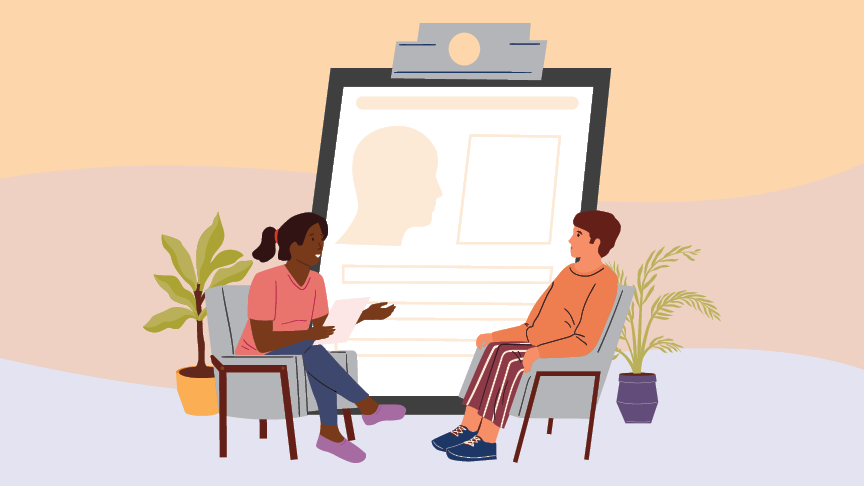
We all need different kinds of support at different times of our lives to ensure we’re the happiest and healthiest version of ourselves. That support can come from family, friends, a GP, or sometimes it means turning to health professionals who can help play a positive part in your recovery journey. We want you to feel cared for, informed, and heard every step of the way. If you’re receiving care from our Mental Health, Alcohol, and Other Drug Service (MHAODS), this blog might be useful to you.
The first steps
You will hear from us by either phone call or letter to let you know the date and time of your appointment. The appointment may be face-to-face, by telephone, or by videoconference. It’s important to remember that you’re not in this alone, which is why you’ll be paired up with a case manager to support you from day one. You’ll see your case manager at appointments as they spend time working on a personalised treatment plan just for you.
It might be helpful to know how long appointments usually last, so you can best plan your day:
- An assessment appointment with a psychiatrist will last for an hour
- A review appointment with a psychiatrist will last for half an hour
- An appointment with your case manager can vary in length.
We understand that attending an appointment might feel overwhelming, especially your first one. This is why you can bring a support person with you. However, this can change depending on any state-wide or health-service wide restrictions so ask our team if you’re not sure.
What should I bring from home?
While you’re getting to know us, we’ll also be getting to know you! So we can best do this, you’ll need to bring some important documents from home. Here’s a handy list of things to pack before your appointment:
- Your Medicare card and/or concession or DVA cards
- Private health fund details, if applicable
- Medical information, including x-rays
- Information about allergies and/or adverse medication reactions
- Letters, reports, referrals, and consent forms relating to your current condition
- A notebook and pen for writing down key pieces of information or any questions you may want to ask your care team
- A copy of your Advanced Health Directive/Enduring Power of Attorney if you have one.
Communication is key
Once you’re at your appointment, we want to make sure every conversation is a constructive one. Our team is here to help, but understand that communicating with health professionals can sometimes feel frustrating. Using some of the tips below can help you feel calm and confident instead:
- It doesn’t help to be threatening or aggressive – respect the rights of staff
- Try to remain calm, even when you don’t feel that way. Ask for time to collect your thoughts if you need to
- If you feel overwhelmed or confused, ask for information in words you understand. You could ask for medication or diagnosis terms to be written down
- Let the health professional know if you feel you are not being heard. You could start by saying, “I feel I am not being heard because…”
- Talk openly and honestly about any needs or concerns you may have
- Spend some time before your appointment writing down any questions you have and take in a pen and paper to write down answers
- Agree on the best way to contact your treating team e.g., email or mobile phone.
Help us, help you
Your well-being is our number one priority. Your care team will always put your safety first, so please let us know if you:
- Have any allergies or reactions to medications
- May have been exposed to any contagious or infectious conditions
- Are in pain or discomfort
- Have been on a recent overseas trip
- Need help or have any special needs
- Feel your condition is getting worse
- Have any concerns about your care
- Wish to provide feedback about our service
- If you have any other health conditions or disabilities.
Will my privacy be protected?
We are committed to keeping your information private and confidential. We’ll ask for your permission before talking to any other people or organisations about you, and you can change your mind about this at any time.
It’s also important to let your care team know if any of your personal information has changed. To ensure we have the most up-to-date details, you’ll regularly be asked if your Medicare number, phone number, or GP details are correct. We will also regularly ask for your name and date of birth to confirm your identity.
Three quick tips to remember
- Darling Downs Health has a zero-tolerance policy for threatening, abusive or violent behaviour. We ask you to treat health workers with respect, dignity and consideration
- It is important you do not stop or make any changes to your medication before discussing this with your treating team
- You can come back at any time if you have concerns about your mental health or alcohol or drug consumption.
For more information about our support services across the Darling Downs visit: www.darlingdowns.health.qld.gov.au/services/mental-health